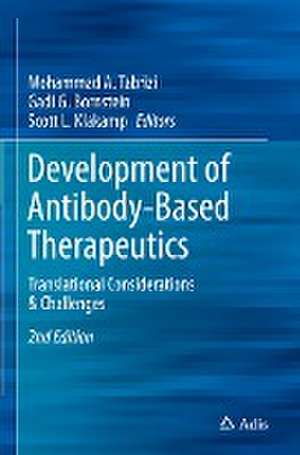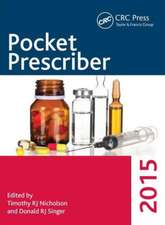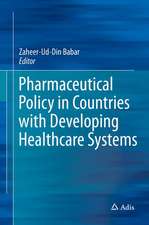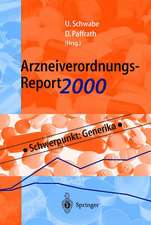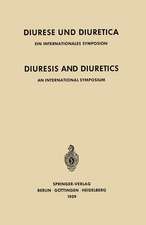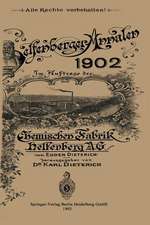Development of Antibody-Based Therapeutics: Translational Considerations & Challenges
Editat de Mohammad A. Tabrizi, Gadi G. Bornstein, Scott L. Klakampen Limba Engleză Hardback – 11 noi 2018
With a key focus on recent developments and advances in the field, this book provides in-depth coverage of topics fundamental to the development of targeted therapeutics. The expansion of targeted modalities in rapidly evolving therapeutic areas, such as immune-oncology, and developments with respect to combination therapies, novel technologies, and the therapeutic application of antibody-drug conjugates, are presented. Additionally, the book builds upon topics discussed in the first edition (2012) where recent innovations warrant elaboration.
This, the second edition of Development of Antibody-Based Therapeutics: Translational Considerations, represents a comprehensive evaluation of progress in the field, which sits alongside the first edition to inform, in detail, professional and academic researchers, as well as graduate students.
| Toate formatele și edițiile | Preț | Express |
|---|---|---|
| Paperback (2) | 976.25 lei 39-44 zile | |
| Springer Nature Singapore – 29 ian 2019 | 976.25 lei 39-44 zile | |
| Springer – 7 mai 2014 | 1291.36 lei 6-8 săpt. | |
| Hardback (1) | 990.01 lei 39-44 zile | |
| Springer Nature Singapore – 11 noi 2018 | 990.01 lei 39-44 zile |
Preț: 990.01 lei
Preț vechi: 1042.11 lei
-5% Nou
Puncte Express: 1485
Preț estimativ în valută:
189.49€ • 197.08$ • 158.79£
189.49€ • 197.08$ • 158.79£
Carte tipărită la comandă
Livrare economică 10-15 martie
Preluare comenzi: 021 569.72.76
Specificații
ISBN-13: 9789811304958
ISBN-10: 9811304955
Pagini: 250
Ilustrații: VIII, 248 p. 106 illus., 87 illus. in color.
Dimensiuni: 155 x 235 x 15 mm
Greutate: 0.54 kg
Ediția:2nd ed. 2018
Editura: Springer Nature Singapore
Colecția Adis
Locul publicării:Singapore, Singapore
ISBN-10: 9811304955
Pagini: 250
Ilustrații: VIII, 248 p. 106 illus., 87 illus. in color.
Dimensiuni: 155 x 235 x 15 mm
Greutate: 0.54 kg
Ediția:2nd ed. 2018
Editura: Springer Nature Singapore
Colecția Adis
Locul publicării:Singapore, Singapore
Descriere
The biologics market continues to witness an impressive rate of growth and the monoclonal antibody market, in particular, has contributed remarkably to the expansion of this segment within the pharmaceutical industry. In 2006, close to 80% of the annual biologics growth rate in the United States (US) was attributed to cancer and anti-TNF antibodies, with increases in growth of 56% and 25%, respectively, compared to those in the previous year. Additionally, the monoclonal antibody sector is anticipated to achieve a growth rate of approximately 14% by 2012, easily outstripping the predicted 0.6% growth rate in the small molecules market. The robust late-stage antibody pipeline within the biotech sector has drawn an increasing amount of interest from the large pharmaceutical industry and has triggered the largest product and platform deals in 2006, with values more than $2.1 and $5.1 billion in partnering and mergers and acquisitions, respectively. Additionally, with the forthcoming emergence of biogenerics, next-generation bio-improved antibodies have drawn much attention and increasingly contribute to the growth of the biologics segment. As next-generation monoclonal antibodies confront their first-generation rivals, it is critical that these next-generation products offer a clear differentiating advantage against the existing competition. Successful strategies for the development of monoclonal antibodies require integration of knowledge with respect to target antigen properties, antibody design criteria such as affinity, isotype selection, Fc domain engineering, pharmacokinetic and pharmacodynamic (PK/PD) properties, antibody cross-reactivity across species, market differentiation opportunities for the first- and next-generation leads, and regulatory requirements from the early stages of antibody development. Biophysical measurements are one of the critical components necessary for the design of effective translational strategies for lead selection and evaluation of relevant animal species for preclinical safety and efficacy studies. Incorporation of effective translational strategies from the early stages of the antibody development process is a necessity, and when considered, it not only reduces development time and cost, but also fosters implementation of rational decision-making throughout all phases of antibody development. Translational strategies for development of antibody-based therapeutics should allow understanding of the relationship between the ‘unit dose’ and ‘unit effect’ with respect to both beneficial and deleterious effects from early stages of development. The flow of information from later to earlier stages of development should provide opportunities to facilitate selection of more effective and novel next-generation drug candidates. Selection and evaluation of relevant biomarkers in early preclinical development in “relevant” animal models should allow for identifying potential risks to humans and establishing safe First-In-Human (FIH) dosing strategies. Hence, integration of knowledge with respect to target antigen properties such as antigen distribution, expression profile, kinetic properties, target pharmacology, antigen isoforms and pharmacological redundancy in health and disease, as well as antibody design criteria, such as antibody isotype, affinity, PK/PD and safety is a critical necessity for the design of effective translational strategies. Additionally, these factors will further offer critical differentiating characteristics for next-generation antibodies, and novel technologies prove instrumental in generation of bio-improved antibody candidates for market entry. This book will examine many important considerations necessary for the design of effective translational strategies during the development of antibody-based therapeutics.
Cuprins
1. Introduction.- 2. Translational Considerations and Challenges: An Overview.- 3. Considerations for Construct and Affinity Design Goals.- 4. Epitope Characterization and Isotype Selection.- 5. Biophysical Considerations for Development of Antibody-Based Therapeutics.- 6. Novel Technologies for Generation of Bispecific Constructs.- 7. Stimulus-Response Mechanisms: An Overview.- 8. Evaluation of Tumor Growth Inhibition in Preclinical Tumor Models –A Quantitative Approach.- 9. Application of Proof-of-Mechanism Biomarkers (POM) in Design and Development of Biologics Modalities.- 10. Antibody Drug Conjugates: Translational Considerations.- 11. Application of PK-PD Modeling and Simulation Approaches for Immuno-Oncology Drugs.- 12. Translational Biomarkers: Application in the Clinical Development of Combination Therapies.
Notă biografică
Mohammad A. Tabrizi, Ph.D. is a leader in translational sciences as related to development of antibody-based therapeutics. His product development experience spans many therapeutic areas including oncology and inflammatory disease, and his technical expertise includes preclinical pharmacology and safety, preclinical and clinical pharmacokinetics, pharmacodynamics, GLP-compliant bioanalytics, and clinical pharmacology of therapeutic monoclonal antibodies.
Gadi G. Bornstein, Ph.D. has nearly twenty years of experience in Oncology R&D with an emphasis in preclinical antibody discovery and development. Dr. Bornstein currently leads and directs biologics discovery efforts at TESARO. He received his B.S. in biochemistry at the University of California, Davis and his doctoral degree in biochemistry at the University of Southern California Keck School of Medicine. Dr. Bornstein completed his postdoctoral training at Stanford University in the Division of Immunology and Rheumatology. Following his postdoctoral training, Dr. Bornstein joined Amgen Fremont, Inc. (formerly Abgenix, Inc.) as a Staff Scientist in the Preclinical Oncology department. Dr. Bornstein has held roles of increasing responsibility at AstraZeneca, Pfizer, and Novartis, where he was a project team leader, lead biologist, and key contributor to scientific strategies for multiple oncology programs. Dr. Bornstein has authored numerous research papers, reviews, as well as book chapters, and is a co-inventor on multiple patents.
Scott L. Klakamp, Ph.D. is one of the leading scientists in utilizing Surface Plasmon Resonance (SPR) and KinExA® to measure the binding kinetics and equilibrium dissociation constants of human monoclonal antibody/antigen complexes. He was the founder of SKD Consulting LLC and acted as Principal Consultant at that company during the development of this title. Prior to SKD Consulting LLC, he was the Vice President of Chemistry and Biochemistry at BiOptix Inc., a company that provided the 404pi biosensor. Dr. Klakamp has also held positions of increasing responsibility in the areas of analytical and biophysical characterization at Chiron, Amgen/Abgenix, AstraZeneca/MedImmune, and Takeda Pharmaceuticals.Dr. Klakamp has been an author on over 30 research and review papers, book chapters, and patents. He has also been an invited speaker at numerous international and national meetings. Dr. Klakamp received his B.A. in Chemistry from Houghton College and his PhD in Chemistry at the Pennsylvania State University. From 1990 to 1993, he completed a postdoctoral fellowship (funded by a National Research Service Award from the National Institutes of Health) at the California Institute of Technology in bioinorganic chemistry.
Gadi G. Bornstein, Ph.D. has nearly twenty years of experience in Oncology R&D with an emphasis in preclinical antibody discovery and development. Dr. Bornstein currently leads and directs biologics discovery efforts at TESARO. He received his B.S. in biochemistry at the University of California, Davis and his doctoral degree in biochemistry at the University of Southern California Keck School of Medicine. Dr. Bornstein completed his postdoctoral training at Stanford University in the Division of Immunology and Rheumatology. Following his postdoctoral training, Dr. Bornstein joined Amgen Fremont, Inc. (formerly Abgenix, Inc.) as a Staff Scientist in the Preclinical Oncology department. Dr. Bornstein has held roles of increasing responsibility at AstraZeneca, Pfizer, and Novartis, where he was a project team leader, lead biologist, and key contributor to scientific strategies for multiple oncology programs. Dr. Bornstein has authored numerous research papers, reviews, as well as book chapters, and is a co-inventor on multiple patents.
Scott L. Klakamp, Ph.D. is one of the leading scientists in utilizing Surface Plasmon Resonance (SPR) and KinExA® to measure the binding kinetics and equilibrium dissociation constants of human monoclonal antibody/antigen complexes. He was the founder of SKD Consulting LLC and acted as Principal Consultant at that company during the development of this title. Prior to SKD Consulting LLC, he was the Vice President of Chemistry and Biochemistry at BiOptix Inc., a company that provided the 404pi biosensor. Dr. Klakamp has also held positions of increasing responsibility in the areas of analytical and biophysical characterization at Chiron, Amgen/Abgenix, AstraZeneca/MedImmune, and Takeda Pharmaceuticals.Dr. Klakamp has been an author on over 30 research and review papers, book chapters, and patents. He has also been an invited speaker at numerous international and national meetings. Dr. Klakamp received his B.A. in Chemistry from Houghton College and his PhD in Chemistry at the Pennsylvania State University. From 1990 to 1993, he completed a postdoctoral fellowship (funded by a National Research Service Award from the National Institutes of Health) at the California Institute of Technology in bioinorganic chemistry.
Textul de pe ultima copertă
With a key focus on recent developments and advances in the field, this book provides in-depth coverage of topics fundamental to the development of targeted therapeutics. The expansion of targeted modalities in rapidly evolving therapeutic areas, such as immune-oncology, and developments with respect to combination therapies, novel technologies, and the therapeutic application of antibody-drug conjugates, are presented. Additionally, the book builds upon topics discussed in the first edition (2012) where recent innovations warrant elaboration.
This, the second edition of Development of Antibody-Based Therapeutics: Translational Considerations, represents a comprehensive evaluation of progress in the field, which sits alongside the first edition to inform, in detail, professional and academic researchers, as well as graduate students.
Mohammad A. Tabrizi, Ph.D. is a leader in translational sciences as related to development of antibody-based therapeutics. His product development experience spans many therapeutic areas including oncology and inflammatory disease, and his technical expertise includes preclinical pharmacology and safety, preclinical and clinical pharmacokinetics, pharmacodynamics, GLP-compliant bioanalytics, and clinical pharmacology of therapeutic monoclonal antibodies.
Gadi Bornstein, Ph.D. has over seventeen years of experience in Oncology R&D with an emphasis in preclinical antibody discovery and development. Dr. Bornstein currently leads and directs biologics discovery efforts at TESARO. He received his B.S. in biochemistry at the University of California, Davis and his doctoral degree in biochemistry at the University of Southern California Keck School of Medicine. Dr. Bornstein completed his postdoctoral training at Stanford University in the Division of Immunology and Rheumatology.
Gadi Bornstein, Ph.D. has over seventeen years of experience in Oncology R&D with an emphasis in preclinical antibody discovery and development. Dr. Bornstein currently leads and directs biologics discovery efforts at TESARO. He received his B.S. in biochemistry at the University of California, Davis and his doctoral degree in biochemistry at the University of Southern California Keck School of Medicine. Dr. Bornstein completed his postdoctoral training at Stanford University in the Division of Immunology and Rheumatology.
Following his postdoctoral training, Dr. Bornstein joined Amgen Fremont, Inc. (formerly Abgenix, Inc.) as a Staff Scientist in the Preclinical Oncology department. Dr. Bornstein has held roles of increasing responsibility at AstraZeneca, Pfizer, and Novartis, where he was a project team leader, lead biologist, and key contributor to scientific strategies for multiple oncology programs. Dr. Bornstein has authored numerous research papers, reviews, as well as book chapters, and is a co-inventor on multiple patents.
Scott L. Klakamp, Ph.D. is one of the leading scientists in utilizing Surface Plasmon Resonance (SPR) and KinExA® to measure the binding kinetics and equilibrium dissociation constants of human monoclonal antibody/antigen complexes. He was the founder of SKD Consulting LLC and acted as Principal Consultant at that company during the development of this title. Prior to SKD Consulting LLC, he was the Vice President of Chemistry and Biochemistry at BiOptix Inc., a company that provided the 404pi biosensor. Dr. Klakamp has also held positions of increasing responsibility in the areas of analytical and biophysical characterization at Chiron, Amgen/Abgenix, AstraZeneca/MedImmune, and Takeda Pharmaceuticals.
Scott L. Klakamp, Ph.D. is one of the leading scientists in utilizing Surface Plasmon Resonance (SPR) and KinExA® to measure the binding kinetics and equilibrium dissociation constants of human monoclonal antibody/antigen complexes. He was the founder of SKD Consulting LLC and acted as Principal Consultant at that company during the development of this title. Prior to SKD Consulting LLC, he was the Vice President of Chemistry and Biochemistry at BiOptix Inc., a company that provided the 404pi biosensor. Dr. Klakamp has also held positions of increasing responsibility in the areas of analytical and biophysical characterization at Chiron, Amgen/Abgenix, AstraZeneca/MedImmune, and Takeda Pharmaceuticals.
Dr. Klakamp has been an author on over 30 research and review papers, book chapters, and patents. He has also been an invited speaker at numerous international and national meetings. Dr. Klakamp received his B.A. in Chemistry from Houghton College and his PhD in Chemistry at the Pennsylvania State University. From 1990 to 1993, he completed a postdoctoral fellowship (funded by a National Research Service Award from the National Institutes of Health) at the California Institute of Technology in bioinorganic chemistry.
Caracteristici
Offers new insight into strategies for development of antibody-based therapeutics
Discusses design of animal models in identifying potential risks to humans
Shows how the flow of information from later to earlier stages of development can facilitate selection of more effective novel and next-generation drug candidates
Discusses design of animal models in identifying potential risks to humans
Shows how the flow of information from later to earlier stages of development can facilitate selection of more effective novel and next-generation drug candidates
